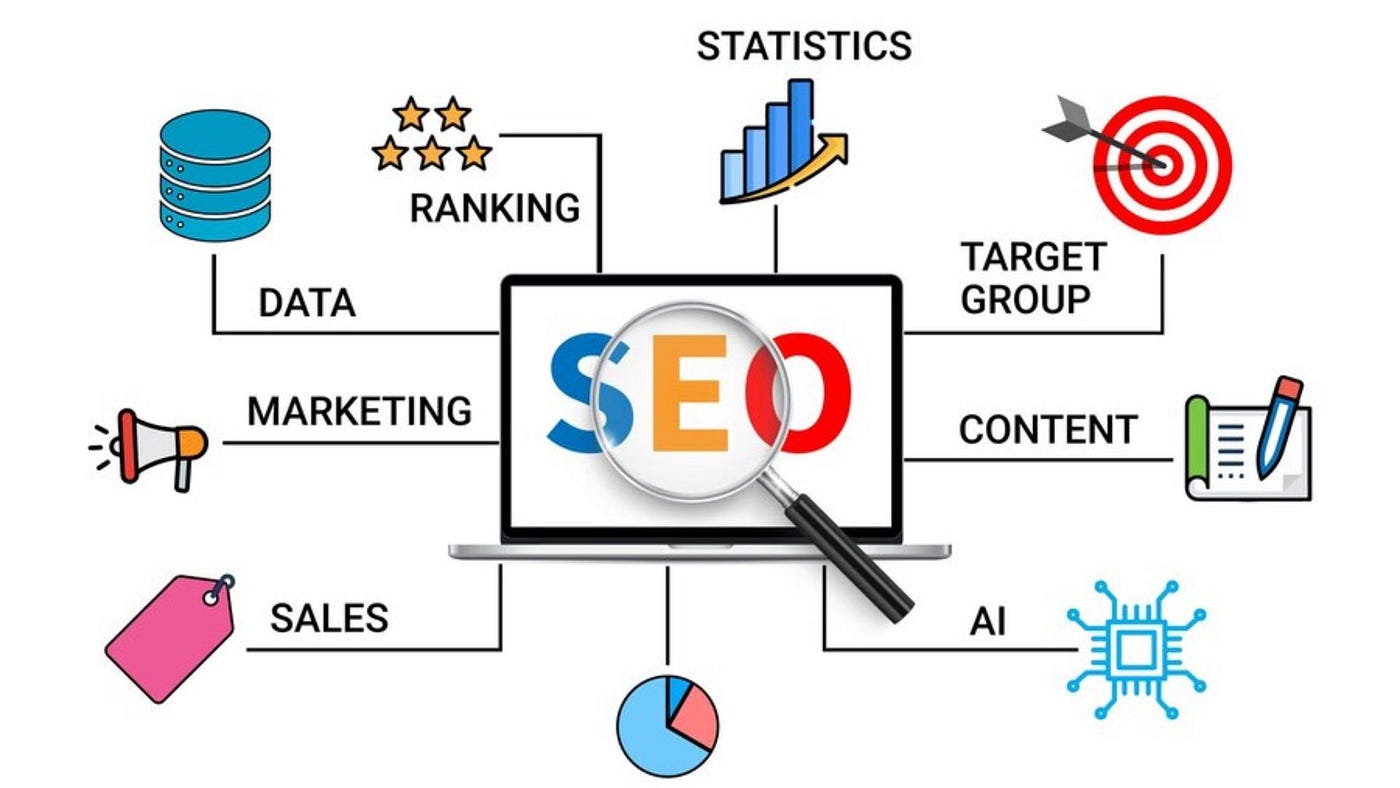
Unlocking Success: The Top Tools for SEO Analysis in 2021
In the ever-evolving landscape of digital marketing, staying ahead of the curve is crucial for success. When it comes to maximizing your online presence, harnessing the power of search engine optimization (SEO) is paramount. In 2021, the competition is fierce, but arming yourself with The Best Tools for SEO Analysis can be the key to unlocking new levels of success. By leveraging these cutting-edge tools, businesses can gain valuable insights, optimize their strategies, and ultimately, elevate their online visibility and performance. Join us as we delve into the top tools that are shaping the SEO game in 2021.
SEO analysis is a crucial component of digital marketing as it helps businesses understand how their website is performing in search engine results. By analyzing key metrics such as keyword rankings, organic traffic, and backlink profiles, businesses can identify opportunities to improve their online visibility and drive more targeted traffic to their website. This data-driven approach allows businesses to make informed decisions on their SEO strategies, ensuring that they are effectively reaching their target audience and maximizing their online presence.
Without SEO analysis, businesses may not fully understand how their website is performing in search engines, which can result in missed opportunities for growth and increased competition from other websites. By regularly conducting SEO analysis, businesses can track their progress over time, identify areas for improvement, and stay ahead of the competition in the ever-evolving digital landscape. Ultimately, SEO analysis is essential for businesses looking to increase their online visibility, attract more qualified leads, and ultimately drive success in the competitive world of digital marketing.
When it comes to evaluating SEO performance, there are several key metrics that can provide valuable insights into the effectiveness of your search engine optimization efforts. One important metric to consider is organic traffic, which refers to the number of visitors that come to your website through unpaid search results. By tracking changes in organic traffic over time, you can assess the impact of your SEO strategies on driving more visitors to your site.
Another crucial metric is keyword rankings, which indicate where your website appears in search engine results for specific keywords. By monitoring changes in keyword rankings, you can determine if your website is gaining visibility for relevant search terms and identify opportunities for improvement. Additionally, analyzing backlink profiles can help you understand the quality and quantity of external websites linking to your site, which can influence your search engine rankings.
In essence, by focusing on these key metrics – organic traffic, keyword rankings, and backlink profiles – you can gain valuable insights into the performance of your SEO efforts and make informed decisions to optimize your website for better visibility and higher search engine rankings.
When it comes to optimizing your website for search engines, having the right SEO analysis tools is crucial. Two popular options that you may have heard of are SEMrush and Ahrefs. Both tools offer comprehensive insights into your site’s performance, keyword rankings, and backlink profiles.
SEMrush is known for its user-friendly interface and robust keyword research capabilities. It provides detailed reports on organic search traffic, paid advertising performance, and social media visibility. On the other hand, Ahrefs is praised for its backlink analysis features and competitive analysis tools. It helps you understand where your competitors are getting their backlinks from and how you can improve your own link-building strategy.
In summary, while SEMrush is great for overall SEO optimization and keyword research, Ahrefs excels in backlink analysis and competitor research. Both tools are essential for any successful SEO strategy, so choosing the one that best fits your specific needs and goals is key to unlocking success in 2021.
In today’s digital landscape, data-driven insights play a crucial role in shaping effective SEO strategies. By leveraging the power of analytics tools and metrics, businesses can gain valuable insights into the performance of their online presence and make informed decisions to drive organic traffic and improve search engine rankings.
Through thorough analysis of key performance indicators such as keyword rankings, click-through rates, and website traffic, companies can identify trends, opportunities, and areas for improvement in their SEO efforts. By using these data-driven insights to optimize content, enhance user experience, and refine marketing strategies, businesses can stay ahead of the competition and increase their visibility in search results.
Ultimately, harnessing the power of data-driven insights for SEO strategy empowers businesses to make strategic decisions that align with their goals, attract more organic traffic, and achieve sustainable growth in the ever-evolving digital landscape. By utilizing tools and techniques that provide valuable analytics and actionable recommendations, companies can optimize their online presence to reach their target audience effectively and drive long-term success.
Optimizing website content is crucial for improving your search engine rankings and attracting more organic traffic. To achieve this, it’s essential to conduct thorough SEO analysis to understand what keywords are driving traffic to your site and how your content is performing. Once you have this data, you can tailor your content to better align with what users are searching for.
One key tip for optimizing website content based on analysis is to incorporate relevant keywords strategically. By using these keywords naturally throughout your content, you can signal to search engines what your page is about and improve its chances of ranking higher in search results. Additionally, optimizing meta tags, headings, and image alt text with relevant keywords can further enhance your content’s SEO performance.
Another important strategy is to regularly update and refresh your content based on analysis insights. By keeping your content current and relevant to users’ search queries, you can maintain or even improve your search rankings over time. Monitoring the performance of your optimized content through tools like Google Analytics can help you track progress and identify areas for further improvement. By continuously analyzing and optimizing your website content, you can stay ahead of the competition and drive more organic traffic to your site.
Backlink analysis is a critical aspect of search engine optimization (SEO) that involves evaluating the links pointing to your website from other sites. These backlinks act as votes of confidence in the eyes of search engines, indicating that your content is valuable and trustworthy. The quality and quantity of backlinks can heavily influence your website’s ranking on search engine results pages (SERPs).
By conducting a thorough backlink analysis, you can gain insights into your website’s link profile, identify high-quality backlinks that boost your SEO efforts, and uncover any toxic or spammy links that could harm your rankings. Understanding the impact of backlinks on SEO can help you develop a strategic link-building strategy to improve your website’s authority and visibility online. Ultimately, investing time and effort into backlink analysis can lead to higher organic traffic, improved search engine rankings, and increased overall success in the competitive online landscape.
Implementing technical SEO recommendations is crucial for improving your website’s visibility and ranking on search engines. By following the insights gained from in-depth analysis, you can optimize your website’s technical aspects to enhance its performance and user experience. This includes addressing issues such as page speed, mobile responsiveness, and proper use of meta tags.
To implement these recommendations effectively, start by prioritizing tasks based on their impact on your website’s SEO. Make sure to fix any broken links, optimize images for faster loading times, and ensure that your website is mobile-friendly. Additionally, update your meta titles and descriptions with relevant keywords to improve your chances of appearing in search results. By consistently monitoring and implementing technical SEO recommendations, you can enhance your website’s overall performance and drive more organic traffic to your site.
Integrating social media data into your SEO analysis in 2021 is crucial for a comprehensive understanding of your online presence. By leveraging insights from platforms like Facebook, Instagram, and Twitter, you can gain valuable information about user engagement, brand sentiment, and content performance. This data can help you identify trends, optimize your content strategy, and improve your search engine rankings.
Incorporating social media data into your SEO analysis allows you to track the impact of your social efforts on your website’s visibility and organic traffic. By analyzing metrics such as social shares, likes, comments, and click-through rates, you can identify which social channels are driving the most traffic to your site and tailor your SEO strategy accordingly. Additionally, monitoring social media conversations about your brand can provide valuable insights into customer preferences and behaviors, helping you create more targeted and engaging content that resonates with your audience. By integrating social media data into your SEO analysis, you can create a more holistic approach to digital marketing that drives better results and enhances your online visibility.
Conducting competitor analysis in SEO is crucial for understanding your position in the online landscape and identifying opportunities for improvement. To begin, it’s essential to identify your main competitors by conducting keyword research and analyzing their online presence. By examining their website structure, content quality, backlink profile, and keyword strategy, you can uncover valuable insights to enhance your own SEO efforts.
Furthermore, monitoring your competitors’ performance on search engine result pages (SERPs) and tracking their ranking changes can provide valuable data for improving your own SEO strategy. By staying informed about your competitors’ tactics and adapting your approach accordingly, you can effectively optimize your website to increase visibility and drive more organic traffic. Ultimately, competitor analysis in SEO serves as a blueprint for achieving success in the digital realm by learning from others’ strengths and weaknesses to propel your website to the forefront of search engine results.
As we look ahead to the future of SEO analysis, we can expect to see a continued emphasis on user experience and quality content. Search engines are becoming increasingly sophisticated in understanding user intent and delivering relevant results. This means that businesses need to focus on creating valuable, engaging content that meets the needs of their target audience.
One emerging trend in SEO analysis is the use of artificial intelligence and machine learning algorithms to analyze and optimize website performance. These technologies can help businesses identify patterns, trends, and opportunities for improvement that may not be immediately apparent through traditional methods. By leveraging AI-powered tools, businesses can gain deeper insights into their SEO efforts and make data-driven decisions to improve their online visibility.
In conclusion, the future of SEO analysis lies in combining technical expertise with a focus on user-centric content. By staying ahead of emerging trends and utilizing cutting-edge tools, businesses can position themselves for success in the ever-evolving digital landscape. Embracing AI technologies and prioritizing user experience will be key factors in achieving sustainable SEO growth in the years to come.



